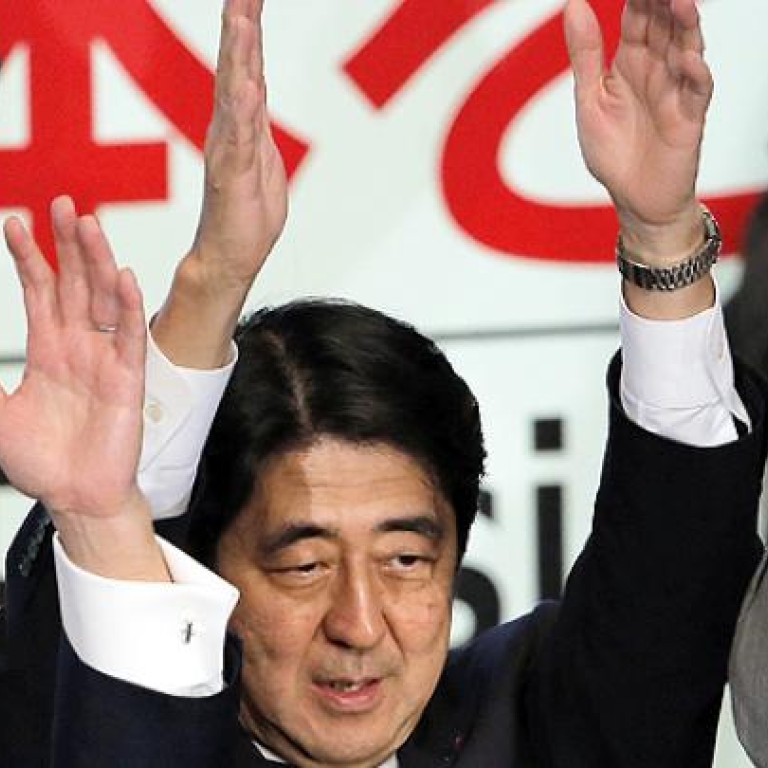
Ex-Japan PM Abe wins opposition party vote
Japan’s main opposition party picked former prime minister Shinzo Abe as its new leader, giving him another shot at premiership and tackling Beijing over territorial disputes.
Japan’s main opposition party picked former prime minister and security hawk Shinzo Abe as its new leader, giving him another shot at premiership and possibly alarming Beijing and Seoul locked in territorial disputes with Tokyo.
Opinion polls suggest that the conservative Liberal Democratic Party (LDP), ousted in 2009 after more than 50 years of almost non-stop rule, will come first in a lower house election expected within months. That would put its leader in position to become the next prime minister.
Abe, who abruptly quit after just a year on office due to ill health in 2007, won a run-off ballot against Shigeru Ishiba, 55, a conservative security expert.
All contenders in the race to lead the LDP have struck hawkish tones as a row with China flared this month after Prime Minister Yoshihiko Noda’s government bought some disputed islets in the East China Sea from their private Japanese owner.
Abe, who entered the race as an underdog because of the circumstances of his resignation, has been most vocal of the candidates in urging Tokyo take a tougher line in its territorial dispute with China and South Korea.
“I think China will be alarmed as will Korea ... I think this might push some of the leaders to start improving ties before the LDP comes to power,” said Sophia University professor Koichi Nakao.
He said Abe’s election could be good news for Noda’s struggling ruling Democrats.
“I think the LDP will probably lose popularity as a result...He is one of the main reasons people ditched the LDP.”
The prospect that Abe could be leading the next government after an election which Noda promised to hold “soon” and which could come as early as November, may ring alarm bells at the Bank of Japan.
Abe has been among most vocal proponents of amending central bank laws to force it to do more to prop up the economy.
Abe, who became Japan’s youngest post-second-world-war prime minister in Septmber 2006, quit after a year marked by scandals, a big election defeat and a crisis over Japan’s support for US-led operations in Afghanistan. He cited ill health as the reason.
The grandson of a wartime cabinet member and one of Japan’s post-war prime ministers, Abe has long called for Japan to tighten its alliance with the United States. He also wants to revise the pacifist constitution made after the second world war.
He has also gained popularity for his tough stance on the emotive issue of abductions of Japanese citizens by North Korea.
He also wants to replace a historic 1995 statement by then-prime minister Tomiichi Murayama, apologising for suffering caused by Japan’s wartime aggression. That is hardly likely to win friends among Asian neighbours.
When in office, however, Abe took a big step to repair Sino-Japanese ties, which had frayed during his predecessor Junichiro Koizumi’s five years in office, in part because of Koizumi’s annual visits to Tokyo’s Yasukuni Shrine for war dead. Abe’s first visit abroad after taking office was to China.
The LDP, long a broad party home to both security hawks and doves, has tilted to the right in recent years.
Opinion polls suggest that it will need a coalition partner and Abe has made it clear he was eyeing a possible tie-up with a party led by populist Osaka Mayor Toru Hashimoto, which critics say is tapping simmering nationalist sentiment.
Such an alliance could drag a new coalition to the right, making it harder to manage ties with China and South Korea.
Whoever takes charge of the world’s third-largest economy after the election will face various unfinished business and deep-rooted problems dogging the economy.
The rebuilding of northeast Japan after a March last year earthquake and tsunami is far from complete and the full decommissioning of the crippled Fukushima nuclear plant will take decades.
Any new government will have to grapple with a revamp of energy policy amid deep public worry about nuclear safety.
On top of that, a plan to double the sales tax that Noda managed to push through an opposition-controlled upper house by promising early elections is seen as just a first step towards cutting Japan’s ballooning public debt.
